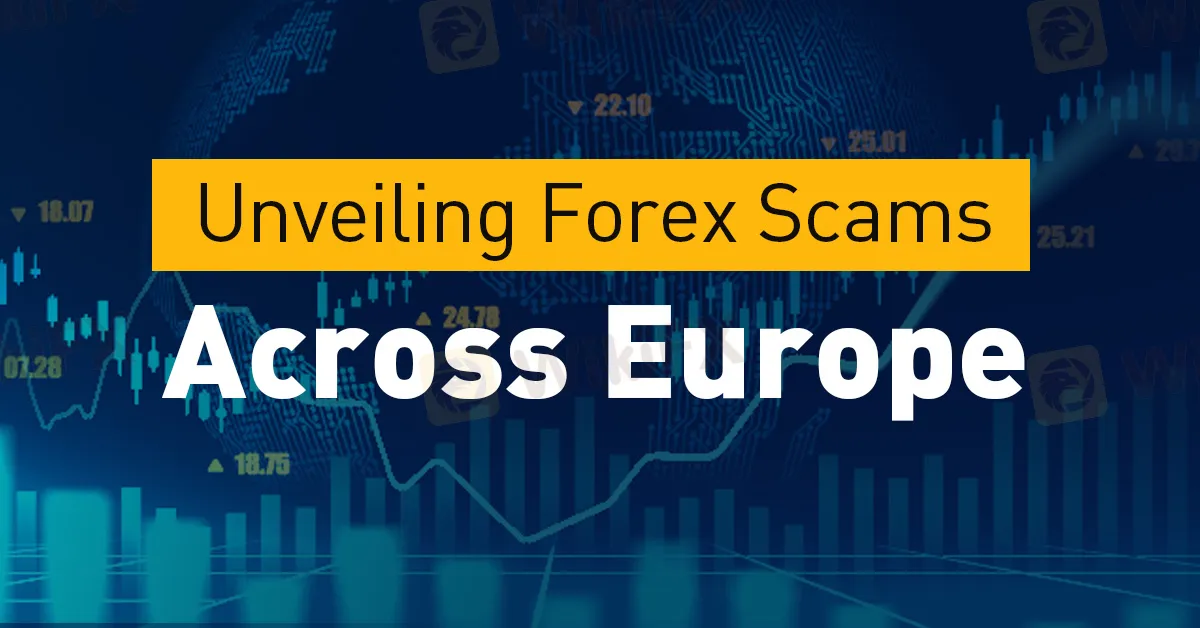简体中文
繁體中文
English
Pусский
日本語
ภาษาไทย
Tiếng Việt
Bahasa Indonesia
Español
हिन्दी
Filippiiniläinen
Français
Deutsch
Português
Türkçe
한국어
العربية
Unveiling Forex Scams Across Europe
Abstract: Safeguarding Your Forex Investments with WikiFX

Forex trading scams are not limited to the UK; they also plague traders across Europe. In this article, we'll delve into some of the biggest forex scams in Europe and introduce you to WikiFX, a valuable tool to protect your investments.
The Widespread Nature of Forex Scams in Europe
Europe, with its diverse financial markets, attracts traders from all over the world. Unfortunately, this diversity also attracts fraudulent actors. In countries like Italy, Spain, and Germany, forex scams have proliferated, with scammers employing various tactics to deceive traders.
Case Study: The EuroTrade Scam
One prominent example is the EuroTrade scam, which lured traders with promises of exclusive trading strategies and guaranteed profits. Traders who fell victim to EuroTrade lost substantial sums of money as the company vanished overnight.
How WikiFX Can Shield European Traders
To protect your investments in Europe's forex market, it's essential to choose reliable brokers. WikiFX, with its extensive database of broker information, can be your ally. WikiFX offers in-depth broker reviews, user ratings, and regulatory information, helping you make informed decisions and steer clear of scams.

Disclaimer:
The views in this article only represent the author's personal views, and do not constitute investment advice on this platform. This platform does not guarantee the accuracy, completeness and timeliness of the information in the article, and will not be liable for any loss caused by the use of or reliance on the information in the article.
Read more

The Daily Habits of a Profitable Trader
Every professional trader follows a structured approach to ensure they are well-prepared, disciplined, and able to seize opportunities with confidence. Whether you are a seasoned investor or an aspiring trader, adhering to a robust daily checklist can significantly enhance your performance. Use this checklist to check if you are a qualified trader

TradingView Brings Live Market Charts to Telegram Users with New Mini App
TradingView has launched a mini app on Telegram, making it easier for users to track market trends, check price movements, and share charts.

Unlocking the Power of Algo Trading: Benefits and Limitation
Algorithmic trading merges speed, data, and automation—but can it outsmart human intuition and market chaos? Explore its power and pitfalls.

Do This ONE Thing to Transform Your Trading Performance Forever
The story is all too familiar. You start trading with high hopes, make some quick profits, and feel like you've finally cracked the code. But then, just as fast as your gains came, they disappear. Your account balance dwindles, and soon you’re left wondering what went wrong. Worse still, fear and confusion creep in, making every new trade a stressful gamble rather than a calculated decision. If this cycle sounds familiar, you’re not alone.
WikiFX Broker
Latest News
INFINOX Partners with Acelerador Racing for Porsche Cup Brazil 2025
Global Panic Builds as Forex Shifts into Risk-Off Mode
SEC Fines Velox Clearing $500,000 for SAR Failures
AUD/USD Hits New Lows as Panic Selling Unfolds Amid Robust U.S. Jobs Report
How to protect your money during Black Monday
Shocking! Oil Prices Plunge Below $60
Singapore Authorities Warned Against WeChat, UnionPay, Alipay Impersonation Scams
Deepfake Scams Nearly Drain $499K from Business
The Dark Side of Trading Gurus: Are You Following a Fraud?
WikiFX Forex Prediction Challenge
Currency Calculator







